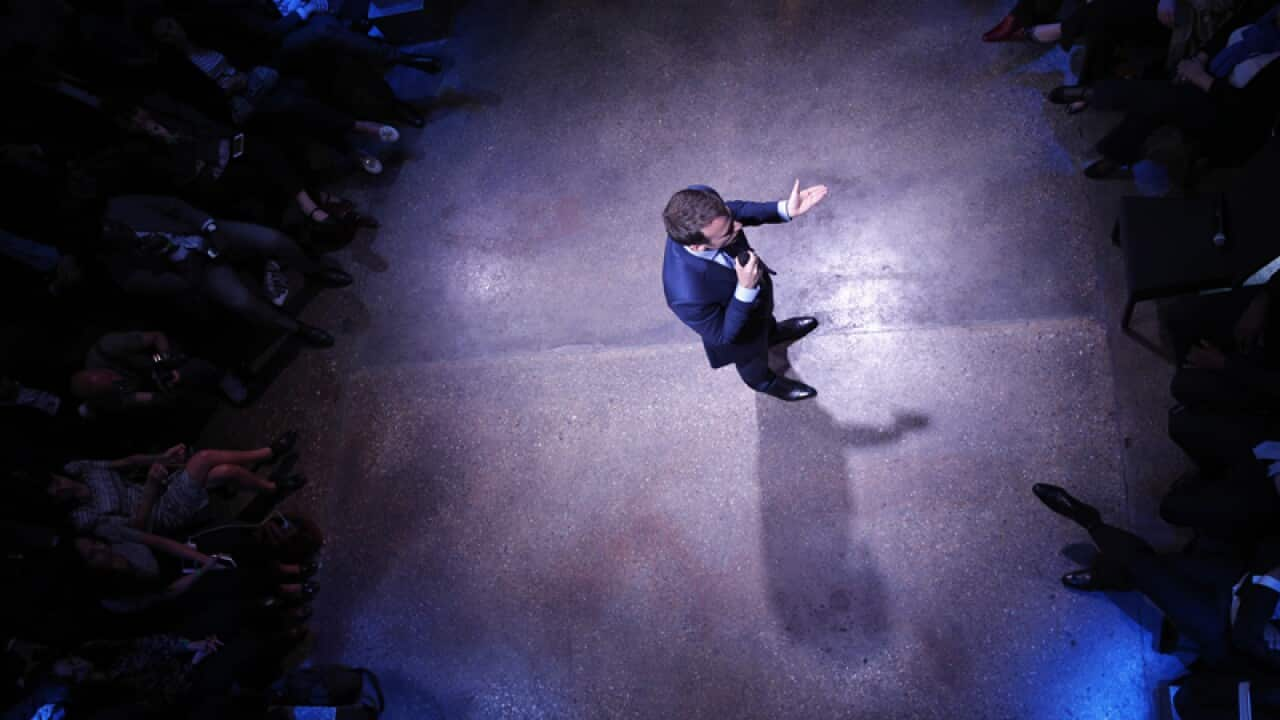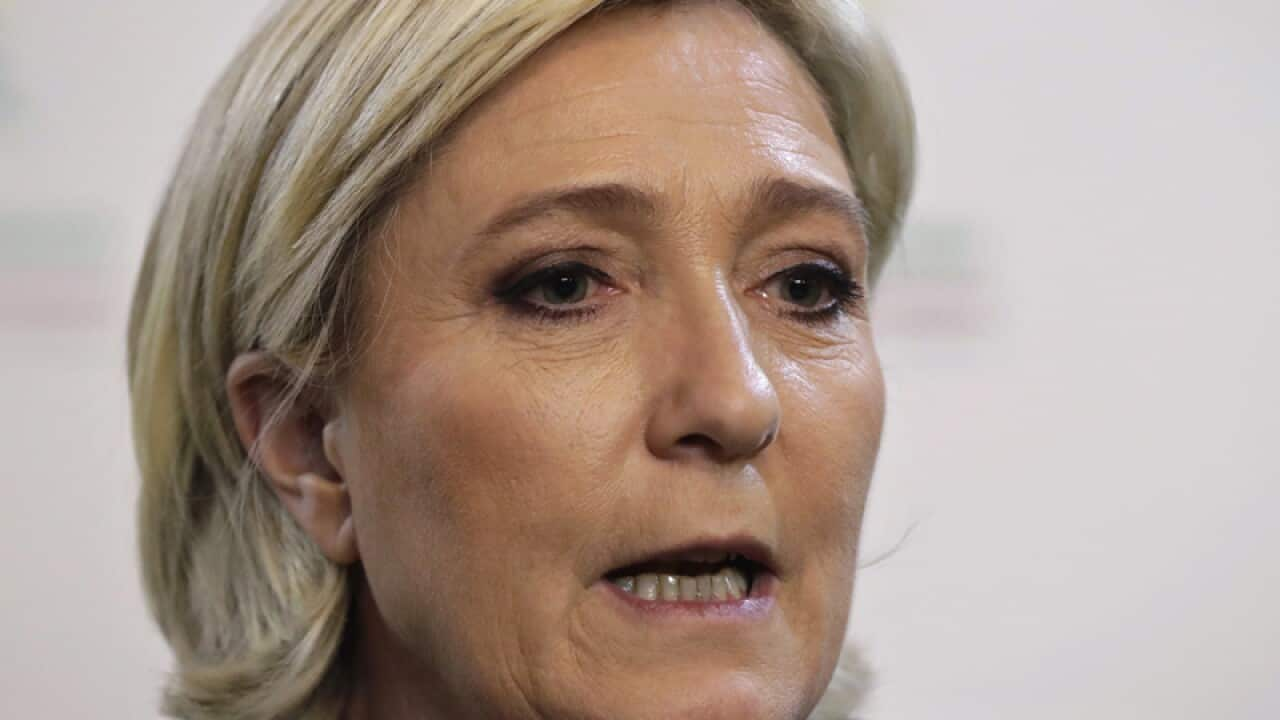French presidential frontrunner Emmanuel Macron attacked far-right leader Marine Le Pen over her economic policy and plans to scrap the euro on Tuesday in an unprecedented debate between all 11 contenders ahead of this month's election.
Macron's attacks were notably more aggressive and personal than in previous debates, landing blows on Marine Le Pen's father, Jean-Marie Le Pen, the first leader of the National Front.
The televised debate was at times chaotic and often dominated by the anti-capitalist and virulently anti-EU smaller candidates who made their first major appearance ahead of the first round of the two-stage vote on April 23.
Watch: Macron and Le Pen locked in an election battle
The most telling clash between the frontrunners came at the end of the first section when 39-year-old Macron took on what is considered one of Le Pen's vulnerabilities - her plans to scrap the euro and revert to the franc.
"What you are proposing, Madame Le Pen, is a reduction in French people's spending power because, by withdrawing from the euro, for savers, workers, it's a reduction in spending power," he said.
Polls show only a third of French voters support scrapping the euro, many of them anxious about the impact of a devaluation which would hit their savings and spur inflation.
Watch: Voters split over French election
Macron, taking a more aggressive approach than in a first debate on March 20, accused her of wanting to start an "economic war" with France's neighbours and denounced nationalism in Europe, which had torn the continent apart and filled graveyards near his hometown Amiens in northeast France.
When Le Pen, 48, replied that Macron was defending the EU by reverting to "old classics" of 50 years ago about Europe's peace-keeping record, Macron retorted with a rare attack on her father, former far-right leader Jean-Marie Le Pen.
"You are repeating the lies that we've heard for 40 years and that we heard from the mouth of your father," he said.
With just 19 days until the first round of voting in a rollercoaster contest, the debate could influence the momentum of the campaign, with around a third of voters still unsure of how they will vote.
Polls show far-right candidate Le Pen and centrist independent Macron in a dead heat at around 25 percent heading into the first round on April 23. Macron is seen easily winning the second round on May 7.

French presidential election candidate for the En Marche ! movement Emmanuel Macron speaks during a debate on 4 April 2017. Source: EPA/LIONEL BONAVENTURE / POOL MAXPPP OUT
'Unfettered globalisation'
Le Pen put in a steady performance under fire, warning about the closure of factories, and the danger of Islamists and immigrants eroding France's national identity.
"I consider that in this election our civilisation is at stake," she said at the start of the debate, promising to restore order and combat "unfettered globalisation".
When questioned about legal problems surrounding her National Front party including campaign financing and the use of expenses at the European parliament, she said she considered herself to be "politically persecuted".
Socialist candidate Benoit Hamon scoffed at her defence, saying it was "amusing to see you playing the victim while spending your time attacking immigrants". One candidate who needed to shine was conservative Francois Fillon, who is seeking to claw back ground after his campaign was almost derailed by criminal charges over claims he paid his wife hundreds of thousands of euros for fake parliamentary jobs.
One candidate who needed to shine was conservative Francois Fillon, who is seeking to claw back ground after his campaign was almost derailed by criminal charges over claims he paid his wife hundreds of thousands of euros for fake parliamentary jobs.

French presidential election attend a debate organized by French private TV channels BFM TV and CNewsin in La Plaine-Saint-Denis, France, 04 April 2017. Source: EPA/LIONEL BONAVENTURE / POOL MAXPPP OUT
Unlike the first debate, Tuesday's featured all of the candidates and not just the top five, prompting fears it could become unwieldy.
They included autoworker Philippe Poutou, who proposed the expropriation of the French banking system, and Communist firebrand Nathalie Arthaud who vowed to protect French workers from being "strangled by the capitalist system".
Other anti-EU nationalists such as Francois Asselineau, Nicolas Dupont-Aignan and Jacques Cheminade, as well as farmer-politician Jean Lassalle, had a rare showcase on the national stage.
Watch: French citizens watch the presidential debate
'Race to the bottom'?
It was the first time that all candidates had debated before the first round of a presidential election in France with many observers sceptical about whether the format would help inform voters.
Writing in Le Monde before the debate, Michel Noblecourt, noted that President Francois Hollande - who decided in December not to seek re-election - warned that the "dangerous" innovation in French politics risked "a race to the bottom".
"The non-candidate president was perhaps not wrong," Noblecourt said.
An editorial in Le Figaro also said "it is not certain that at the end of this unique debate voters will be more enlightened".
The final result of an election that is being watched closely around the world is still seen as highly unpredictable.
Dissatisfaction and outright hostility towards mainstream politics is high in France and surveys show around a third of voters plan to abstain.












